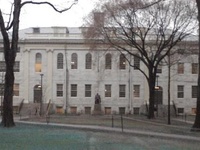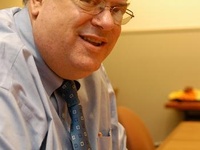“A lot of students are somewhat apathetic about the process because they don’t really see it affecting them,” Mahan says. “It’s not that students don’t care, but they’re busy and they need to be shown why the review is relevant.”
Schmidt, who has not attended any of the administration’s informational meetings, says he organized the meeting because he did not know anything about the review, but was interested in getting involved.
“I’m as much as part of the problem as I am a part of the solution,” he says.
He asked Green to help with the meeting, and after about 25 phone calls and 10 e-mails, the duo had rounded up a sizeable crowd in Schmidt’s Eliot House dorm room.
Schmidt was satisfied with the evening’s results.
“A lot of people who came who were just doing it for food or as a favor to me came out of it saying ‘I didn’t think this mattered before, but this really is something that’s important and something that could effect the Harvard experience,’” says Green. “They’re more willing to help out with the process now.”
Schmidt, who worked on the Howard Dean campaign this summer, says he hopes that more such meetings will occur all over campus as students become more interested in the review.
“Hopefully the people who came will go and make their own gatherings,” he says. “We’d like to get sort of a ripple effect, and to get more people discussing this.”
Green says the next step will be to design a survey with Mahan and the other seven student committee members that will be released to all undergraduates this month.
Mahan says that the survey will cover a lot of ground, supplementing the data collected at the end of last year in the senior and freshman surveys, and will be submitted to the deans for consideration.
FILLING THE VOID
With concrete proposals on the table, the current chapter of the curricular review comes to a close, and it remains unclear exactly what shape next year’s open forum discussions will take.
Two of the student committee members will graduate, several committee members are going on leave next fall, and this year’s working groups will disband before the summer—leaving a void at the review’s core that will have to be somehow filled.
As soon as those crucial organizational decisions are made, the review can enter a new phase of concrete legislation that will be put to a faculty vote.
Every group in the University community—including faculty, students and alumni—looks ready to elbow its way into the discussion next year, and as the floor is opened before Kirby, Gross and Wolcowitz, a truly definitive, and potentially revolutionary curriculum may emerge at Harvard before too long.
—Staff writer Leon Neyfakh can be reached at neyfakh@fas.harvard.edu.











